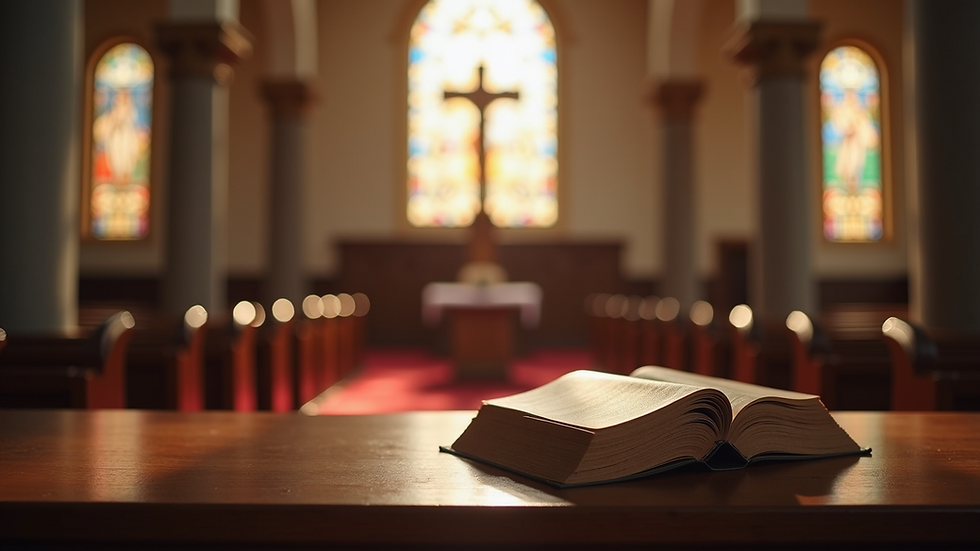The Role of Clergy in Christian Church Theology
- PsychicUnderLord (Psychic)

- Sep 5, 2025
- 4 min read
The role of clergy in Christian theology is a subject that has evolved over centuries and remains central to the life and practice of Christian communities worldwide. Clergy members serve as spiritual leaders, teachers, and caretakers of their congregations. Their responsibilities are deeply rooted in theological principles and church traditions, shaping how faith is lived and expressed. This article explores the multifaceted role of clergy, their theological significance, and practical functions within the church.
Theological Foundations of Clergy in Christian Theology
Christian theology provides the framework for understanding the role of clergy. At its core, clergy are seen as servants of God who act as intermediaries between the divine and the congregation. This role is grounded in biblical teachings, particularly in the New Testament, where figures like the apostles and early church leaders set examples for pastoral care and leadership.
Theologically, clergy are often associated with the concept of sacerdotalism, which emphasizes their role in administering sacraments such as baptism and communion. These sacraments are considered vital means of grace, and clergy are entrusted with their proper administration. Additionally, clergy are tasked with preaching the Word of God, providing spiritual guidance, and fostering the faith community.
The importance of clergy is also reflected in the doctrine of the priesthood of all believers, which acknowledges that while all Christians have a role in ministry, certain individuals are called to serve in a distinct, ordained capacity. This balance between the universal priesthood and ordained ministry is a key theological tension that shapes the understanding of clergy roles.

Clergy Functions in Christian Theology
Clergy perform a variety of functions that are essential to the spiritual health and organizational structure of the church. These functions can be broadly categorized into liturgical, pastoral, educational, and administrative roles.
Liturgical Role: Clergy lead worship services, administer sacraments, and conduct rites such as weddings, funerals, and baptisms. Their presence and leadership in these ceremonies help to create a sacred atmosphere and facilitate communal worship.
Pastoral Role: Providing spiritual care and counseling is a significant part of clergy duties. They support individuals and families through life’s challenges, offering prayer, guidance, and comfort.
Educational Role: Clergy teach Christian doctrine and scripture, often through sermons, Bible studies, and religious education programs. This role helps deepen the faith and understanding of the congregation.
Administrative Role: Managing church operations, coordinating volunteers, and overseeing church programs are practical responsibilities that clergy often handle. Effective administration ensures that the church functions smoothly and meets the needs of its members.
These roles require a combination of theological knowledge, interpersonal skills, and organizational abilities. Clergy must be adaptable to serve diverse congregations and respond to contemporary challenges.

What are offices in the church?
In Christian theology, the term offices in the church refers to the various official roles or positions held by individuals who serve the church community. These offices are often established by scripture and tradition to organize ministry and leadership effectively.
The primary offices typically include:
Bishops - Overseers who provide spiritual and administrative leadership over multiple congregations or a diocese.
Priests or Pastors - Responsible for leading individual congregations, administering sacraments, and preaching.
Deacons - Assistants who support the clergy in service-oriented tasks, such as caring for the needy and managing church resources.
Each office has distinct responsibilities but works collaboratively to fulfill the church’s mission. The concept of offices helps maintain order and accountability within the church structure.
For a deeper understanding of these roles and their historical development, you can explore more about offices in the church.

Historical Development of Clergy Roles
The role of clergy has undergone significant changes throughout Christian history. In the early church, leadership was more fluid, with apostles and elders guiding communities. As Christianity became institutionalized, formal offices and hierarchical structures developed.
During the Middle Ages, the clergy gained considerable social and political power, often acting as intermediaries between the church and secular authorities. The Reformation challenged many of these structures, emphasizing the priesthood of all believers and reducing the exclusive authority of clergy in some denominations.
In modern times, clergy roles continue to evolve. Many churches now emphasize pastoral care and community engagement alongside traditional liturgical duties. The rise of lay ministry and the inclusion of women and diverse groups in ordained roles reflect ongoing theological and cultural shifts.
Understanding this historical context helps appreciate the dynamic nature of clergy roles and their adaptation to changing needs.
Practical Recommendations for Engaging with Clergy
Whether you are a member of a congregation or someone interested in church leadership, understanding how to engage with clergy can enhance your spiritual experience and community involvement.
Attend Services Regularly: Participation in worship led by clergy helps build a connection with church leadership and deepens your faith.
Seek Pastoral Counseling: Don’t hesitate to approach clergy for guidance during difficult times. They are trained to provide spiritual and emotional support.
Get Involved in Church Activities: Volunteering alongside clergy in educational or service programs fosters community and shared purpose.
Respect Clergy Boundaries: Clergy often balance many responsibilities. Being mindful of their time and workload promotes a healthy relationship.
Learn About Church Offices: Understanding the different roles within the church can help you know whom to approach for specific needs or questions.
By actively engaging with clergy and church structures, individuals can contribute to a vibrant and supportive faith community.
The Continuing Importance of Clergy in Christian Life
Clergy remain vital to the life of Christian communities. They embody the theological principles of service, leadership, and spiritual care. Through their diverse roles, clergy help nurture faith, administer sacred rites, and guide believers in their spiritual journeys.
As society changes, clergy continue to adapt, finding new ways to connect with congregations and address contemporary issues. Their commitment to ministry ensures that the church remains a place of hope, learning, and fellowship.
Understanding the role of clergy in Christian theology enriches our appreciation of their work and encourages meaningful participation in the life of the church. Whether through worship, education, or pastoral care, clergy serve as pillars of faith and community.
This exploration of clergy roles highlights their theological significance and practical impact. By recognizing the diverse functions and historical development of clergy, we gain insight into how Christian theology is lived out in everyday church life.



Comments